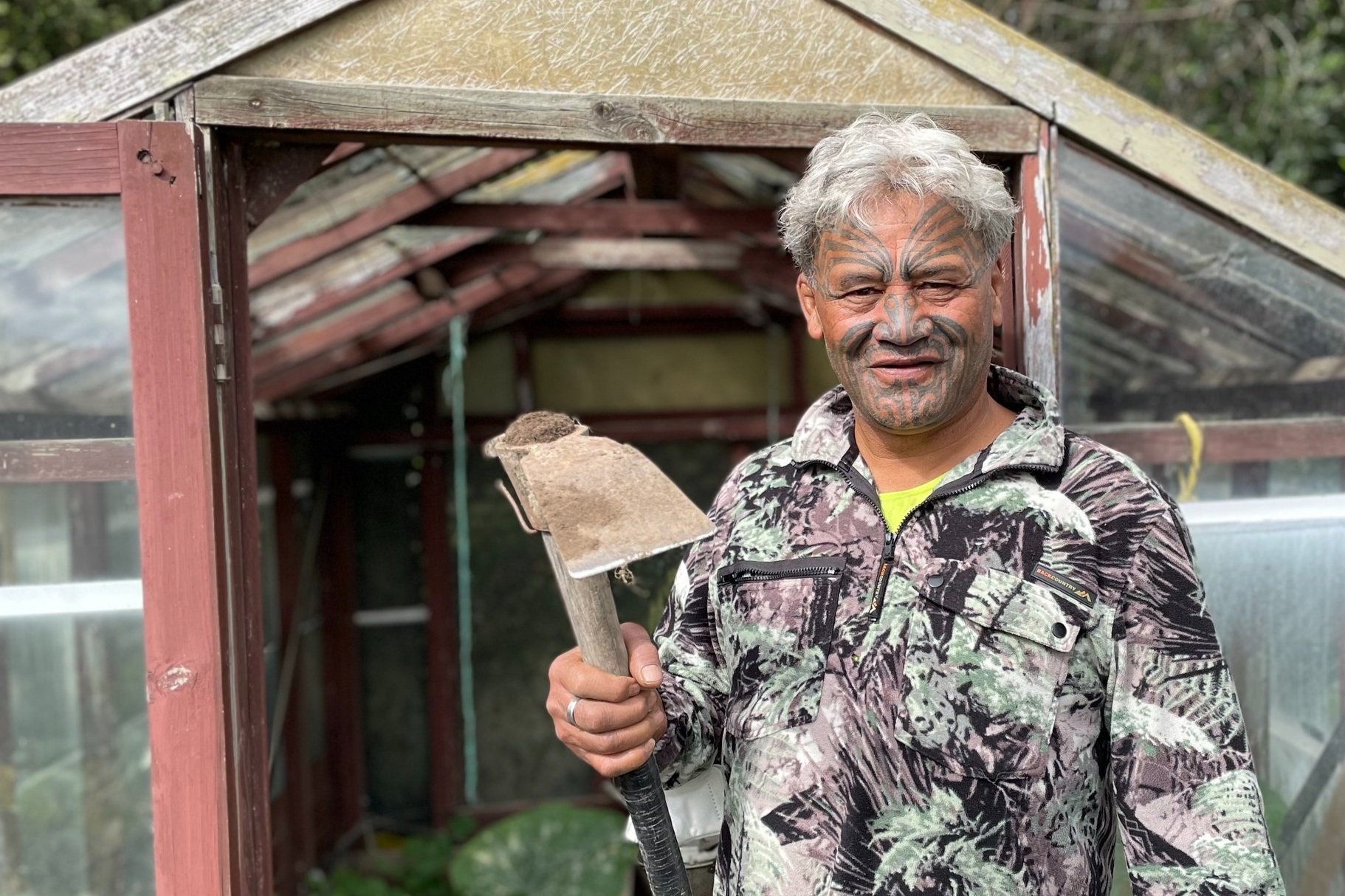Paora (Paul) Poihipi works in the Hei Whakapiki Mauri māra kai in Woodend.
Paora (Paul) Poihipi, Te Whānau-ā-Apanui and Ngāti Porou, grew up working the whenua alongside his grandparents, holding the plough steady and watching his neighbours plant by the new moon. He is now sharing this mātauranga with whānau in Ōtautahi through the Hei Whakapiki Mauri Kōanga Kai gardening project.
“A lot of the old knowledge is gone from generations like my Mum and Dad who moved to the city, but I was sent back to the East Coast to learn the ways. By the full moon we got the ground ready and by the new moon, we planted – but I was never allowed to actually plant as a kid. We had to do the crap jobs,” Paul says.
“By the full moon we got the ground ready and by the new moon, we planted.”
On a 10-acre block near Ōpōtoki and Te Kawa, Paul’s grandparents taught him to grow and harvest kai by the phases of the moon using maramataka; the Māori lunar calendar. He spent his childhood learning to garden, bottle fruit, preserve fish and hunt.
“We lived in a community of about 100 and most of us were kids. The whole community got together to help each other when it was time to plant, harvest, gather kaimoana and for the fruit season. We always had a heap of food in the cupboard, unlike when I went back to Mum and Dad’s.”
“I learned things like to always keep the vegetables that were going bad for next year’s planting. The elders would throw them into the kumara pit to keep them dry so we could use the seeds. The old knowledge was to always stash and dry, and to never throw anything away.”
Paora works with Wayne, another member of the Hei Whakapiki Mauri whānau rōpu, to harvest marrow.
“The old knowledge was to always stash and dry, and to never throw anything away.”
Paul wanted to ensure his tamariki and mokopuna learned to grow, gather, and hunt their own kai. His son Cheyne, who is now in his thirties, has joined him on possum hunts and diving for kaimoana since his teens – no easy feat with his degenerative condition, which means he now uses a wheelchair.
“He loves being out doing what I am doing and being outdoors relaxes him; it always has.”
Cheyne lived with Paul for his teenage years into his twenties. He then joined him Ōtautahi in 2020 after Paul discovered he was living in unsuitable conditions in a residential home in the North Island.
Paul says that they both struggled to adjust to the new city together. Finding an accessible property was particularly difficult and they were living in a motel for quite some time. Cheyne had become very depressed due to his previous living situation and Paul was also advocating for changes to his medication to help him feel more like himself. After Cheyne landed in hospital following a seizure, Paul was told about Waikura, a Whānau Ora Navigator from Hei Whakapiki Mauri.
“Her and Ruth came to visit us after Cheyne had yet another seizure and they raised our ihi right up and really welcomed us to Christchurch. Before that we felt like we had been abandoned and had no help.”
After settling into an accessible home with the help of Hei Whakapiki Mauri, Paul wanted to give back to the kaupapa and offered his services to help grow kai for the network of tāngata whaikaha Māori that Hei Whakapiki Mauri supports.
“I’ve met a lot of struggling people in my life and supported whānau through difficult times, including taking on my mokopuna for many years. I love helping people and being able to help other disabled people and their whānau is second to none. It is the most awesome thing.”
Wayne and Paora showing the progress on growing winter crops for whānau.
“I love helping people and being able to help other disabled people and their whānau is second to none. “
Paul leads the Kōanga Kai programme, which spans six vegetable gardens at the homes of whānau and a large plot at the home of Hei Whakapiki Mauri support worker Andy. Andy and her mother Ngaio donated the vegetable garden space that was previously tended by Andy’s late father, and Paul has transformed it.
“We started with a big weed and then I have followed what he used to do, including where he used to plant the tomatoes and potatoes, because he had an amazing garden.”
To learn more about planting in the South Island, Paul also headed along to the Kaiapoi Community Garden and still seeks tips from the ‘old ladies’ there who ‘know everything there is to know.’
After spending his working life doing all sorts of different mahi, from earthworks and rugby league to palliative care and dairy farming, Paul says that working in the garden is the most satisfying because he feels like he is making a difference for others.
Paul wants to see the Kōanga Kai project grow as he believes gardening brings whānau together. He also wants to help whānau learn more about planting and gathering according to the moon, just like his grandparents did.
The Hei Whakapiki Mauri Kōanga Kai kaupapa is funded by Te Pūtahitanga to support whānau to grow their own, learn about maramataka and access healthy, sustainable kai all year round.


